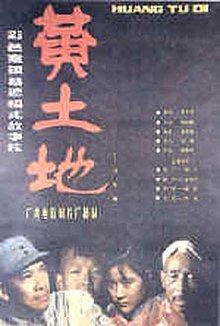| Yellow Earth | |||||||
|---|---|---|---|---|---|---|---|
 Theatrical release poster | |||||||
| Chinese name | |||||||
| Traditional Chinese | 黃土地 | ||||||
| Simplified Chinese | 黄土地 | ||||||
| Literal meaning | yellow soil | ||||||
| |||||||
| Directed by | Chen Kaige | ||||||
| Written by | Chen Kaige Zhang Ziliang (screenplay) Lan Ke (novel) | ||||||
| Starring | Xueqi Wang Bai Xue Quiang Liu Tuo Tan | ||||||
| Cinematography | Zhang Yimou | ||||||
| Music by | Zhao Jiping | ||||||
Production company | Xi'an Film Studio | ||||||
Release date |
| ||||||
Running time | 89 minutes | ||||||
| Country | China | ||||||
| Language | Mandarin | ||||||
Yellow Earth (simplified Chinese: 黄土地; traditional Chinese: 黃土地; pinyin: Huáng tǔdì) is a 1984 Chinese drama film. This film is telling a story of a young, village girl who bravely resists old-dated customs and searches for freedom. It was the directorial debut for Chen Kaige. The film's notable cinematography is by Zhang Yimou. At the 24th Hong Kong Film Awards ceremony on 27 March 2005, a list of 100 Best Chinese Motion Pictures was tallied, and Yellow Earth came in fourth.[1] The film was produced by Guangxi Film Studio (simplified Chinese: 广西电影制片厂; traditional Chinese: 廣西電影製片廠; pinyin: Guǎngxī Diànyǐngzhìpiàn Chǎng).
Zhang Yimou, a colleague of Chen, photographed the film. Richard James Havis, author of Changing the Face of Chinese Cinema: An Interview with Chen Kaige, said that the film was the first Chinese film "at least since the 1949 Communist Liberation, to tell a story through images rather than dialog."[2] Therefore, the film attracted controversy in China. Havis added that the film "was also equivocal about the Communist Party's ability to help the peasants during the Communist revolution", a position which differed from that espoused by the propaganda films that were produced after 1949."[2]